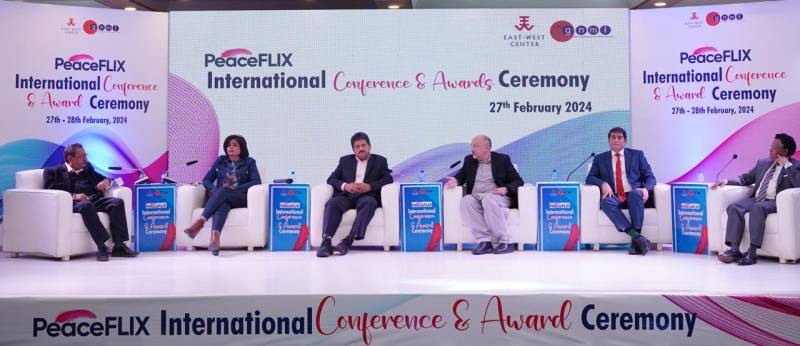
Women are an important part of peacebuilding. The Global Neighbourhood for Media Innovation (GNMI), in collaboration with the East-West Center (EWC), held a two-day conference at Margala Hotel Islamabad to honor the impactful contributions of Pakistani women as decision-makers in peacebuilding and acknowledge the crucial support men provide in this process.
Najia Ashar – President GNMI, on the first day of the two-day conference, greeted all the guests in her welcome remarks. Najia spoke on the topic “Peace on the Brink of Polycrisis.” She spotlighted the transformative power of media in amplifying marginalized voices, creating social change, and building bridges of understanding. She reaffirmed GNMI's commitment to combat radical narratives and highlighted the significance of collaborative efforts to address the root causes of conflict.
Suzanne Vares-Lum, President of the East-West Center (Hawaii US), in her address on "Women, Peace, and Global Partnerships for Third-track Diplomacy" highlighted the significant role women play in promoting peace and the significance of collaborative global partnerships in third-track diplomacy.
Murtaza Solangi, the interim Federal Minister for Information and Broadcasting, said in his keynote speech that the eradication of extremism is imperative now, as its unchecked proliferation could significantly impact future generations. He underlined the crucial role of media in framing a peaceful and inclusive Pakistan by disseminating positive narratives of peace. Minister Solangi commended the sacrifices made by law enforcement agencies in safeguarding national security and acknowledged the contributions of think tanks, civil society organizations, and peace institutions in shaping concrete policy recommendations for national stability.
Ahsan Iqbal, the General Secretary of PMLN, elaborated on the intricate dynamics of peace, asserting that it is shaped by a myriad of factors of political, social, and economic dimensions. He bemoaned the exacerbation of societal divisions such as ethnicity, class, and religion, which fuel the formation of groups that dehumanize specific communities and perpetuate divisive rhetoric. The former Interior Minister lamented the normalization of an "us versus them" mentality, which exacerbates social rifts and propagates the perception that violence is the only means of conflict resolution. He emphasized the importance of rigorous data analysis to facilitate evidence-based decision-making and advocated for engaging stakeholders to develop comprehensive peace policies.
Two panel discussions were held which were the integral components of the event. The first discussion, titled "Media Diplomacy in Pakistan: Shaping Peace Narratives for Regional Stability", was moderated by Dr. Shafqat Munir of SDPI. The panelists included senior broadcast journalist Hamid Mir, Managing Editor of Independent Urdu Haroon Rashid, anchorperson Ms. Nayyar Ali, Syed Masood Raza, and Prof. Dr. Moazzam Hashmi from the National Defense University (NDU).
The second, titled "The Ripple Effect: Local Tales Defeating Extremism", was moderated by Komal Dilshad of USIP and the panel included Hamayoun Khan from Friedrich Ebert Stiftung (FES), Pakistan, Mumtaz Mughal from Aurat Foundation Islamabad, Ghulam Murtaza from Peace Education Foundation, Aftab Alam from IRADA, and journalist Lubna Jerar Naqvi.
The East-West Center Hawaii (US) team brought their expertise to the event, with key members including Suzanne Vares-Lum, President of East-West Center, Ann Hartman, Director and Dean of Professional Development and Education, Christina Monroe, Director of Alumni Engagement, and Gretchen Alther, Leadership Program Senior Manager. International experts Charlie Allen (Australia) and Irene Santiago (Philippines) conducted an interactive workshop for peacebuilders, students, and civil society members to explore significant components of promoting positive peace.
Breakout sessions provided a platform for interaction between peacebuilders and experts, aiming to explore future opportunities in community cohesion, interfaith harmony, and women's leadership.
The conference ended with the PeaceFLIX Awards ceremony in which twelve peacebuilders, selected through a vigorous process from across Pakistan, were given awards. They represented diverse regions and provinces and were honored for their commendable efforts in promoting peace nationwide.

